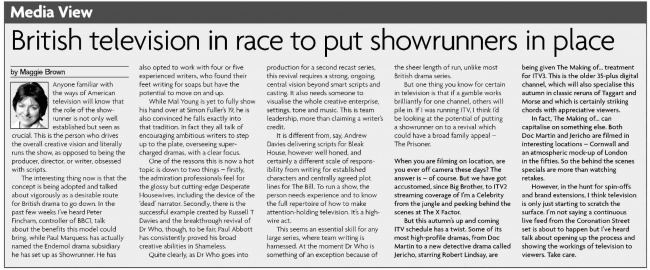British television in race to put showrunners in place
- Publication: The Stage
- Date: 2005-08-04
- Author: Maggie Brown
- Page: 12
- Language: English
Anyone familiar with the ways of American television will know that the role of the show-runner is not only well established but seen as crucial. This is the person who drives the overall creative vision and literally runs the show, as opposed to being the producer, director, or writer, obsessed with scripts.
The interesting thing now is that the concept is being adopted and talked about vigorously as a desirable route for British drama to go down. In the past few weeks I've heard Peter Fincham, controller of BBC1, talk about the benefits this model could bring, while Paul Marquess has actually named the Endemol drama subsidiary he has set up as Showrunner. He has also opted to work with four or five experienced writers, who found their feet writing for soaps but have the potential to move on and up.
While Mal Young is yet to fully show his hand over at Simon Fuller's 19, he is also convinced he falls exactly into that tradition. In fact they all talk of encouraging ambitious writers to step up to the plate, overseeing supercharged dramas, with a clear focus.
One of the reasons this is now a hot topic is down to two things — firstly, the admiration professionals feel for the glossy but cutting-edge Desperate Housewives, including the device of the 'dead' narrator. Secondly, there is the successful example created by Russell T Davies and the breakthrough revival of Dr Who, though, to be fair, Paul Abbott has consistently proved his broad creative abilities in Shameless.
Quite clearly, as Dr Who goes into production for a second recast series, this revival requires a strong, ongoing, central vision beyond smart scripts and casting. It also needs someone to visualise the whole creative enterprise, settings, tone and music. This is team leadership, more than claiming a writer's credit.
It is different from, say, Andrew Davies delivering scripts for Bleak House, however well honed, and certainly a different scale of responsibility from writing for established characters and centrally agreed plot lines for The Bill. To run a show, the person needs experience and to know the full repertoire of how to make attention-holding television. It's a high-wire act.
This seems an essential skill for any large series, where team writing is harnessed. At the moment Dr Who is something of an exception because of the sheer length of run, unlike most British drama series.
But one thing you know for certain in television is that if a gamble works brilliantly for one channel, others will pile in. If I was running IN, I think I'd be looking at the potential of putting a showrunner on to a revival which could have a broad family appeal —The Prisoner.
When you are filming on location, are you ever off camera these days? The answer is — of course. But we have got accustomed, since Big Brother, to ITV? streaming coverage of I'm a Celebrity from the jungle and peeking behind the scenes at The X Factor.
But this autumn's up and coming ITV schedule has a twist. Some of its most high-profile dramas, from Doc Martin to a new detective drama called Jericho, starring Robert Lindsay, are being given The Making of... treatment for ITV3. This is the older 35-plus digital channel, which will also specialise this autumn in classic reruns of Taggart and Morse and which is certainly striking chords with appreciative viewers.
In fact, The Making of... can capitalise on something else. Both Doc Martin and Jericho are filmed in interesting locations — Cornwall and an atmospheric mock-up of London in the fifties. So the behind the scenes specials are more than watching retakes.
However, in the hunt for spin-offs and brand extensions, I think television is only just starting to scratch the surface. I'm not saying a continuous live feed from the Coronation Street set is about to happen but I've heard talk about opening up the process and showing the workings of television to viewers. Take care.
Disclaimer: These citations are created on-the-fly using primitive parsing techniques. You should double-check all citations. Send feedback to whovian@cuttingsarchive.org
- APA 6th ed.: Brown, Maggie (2005-08-04). British television in race to put showrunners in place. The Stage p. 12.
- MLA 7th ed.: Brown, Maggie. "British television in race to put showrunners in place." The Stage [add city] 2005-08-04, 12. Print.
- Chicago 15th ed.: Brown, Maggie. "British television in race to put showrunners in place." The Stage, edition, sec., 2005-08-04
- Turabian: Brown, Maggie. "British television in race to put showrunners in place." The Stage, 2005-08-04, section, 12 edition.
- Wikipedia (this article): <ref>{{cite news| title=British television in race to put showrunners in place | url=http://cuttingsarchive.org/index.php/British_television_in_race_to_put_showrunners_in_place | work=The Stage | pages=12 | date=2005-08-04 | via=Doctor Who Cuttings Archive | accessdate=26 December 2025 }}</ref>
- Wikipedia (this page): <ref>{{cite web | title=British television in race to put showrunners in place | url=http://cuttingsarchive.org/index.php/British_television_in_race_to_put_showrunners_in_place | work=Doctor Who Cuttings Archive | accessdate=26 December 2025}}</ref>
